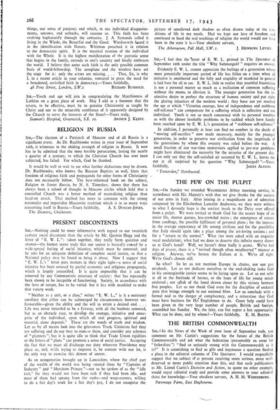PRESENT DISCONTENTS
SIR,—Nothing could be more informative with regard to our twentieth century social discontent than the article by Mr. Quintin Hogg and the letter of " E. W. L.": taken together, they really form question and answer—the former states truly that our unrest is basically caused by a wide-spread feeling of social injustice, which must be removed; and he asks for an adequate definition of complete social justice, so that a National policy may be found to bring it about. Now I suggest that " E. W. L.'s " letter puts matters in their right hght—a sense of social injustice has been aroused by partial economic and religious propaganda, which is largely unjustified. It is quite impossible that it can be removed by any Communistic structure of society: that has repeatedly been shown to be incapable of functioning. Society, in accordance with the laws of nature, has to bo varied. but it lies with mankind to make that variety work.
" Neither as a unit, or a class," writes "E. W. L.," is it a necessary corollary that either can be submerged by circumstances however un- favourable—given the ability and the will to attain a desired end. . . . Life was never intended to be a fairway, with all the bunkers removed, but as an obstacle race, to develop the courage, initiative and enter- prise of the individual, upon which all real progress, spiritual and material, alone depends." These are the words of truth and wisdom. Let us by all means look into the grievances Trade Unionists feel they are suffering and do our best to remove them, and consider any schemes of " planners "; but it is quite idle to think that Trade Union rigidities or the fetters of " plans " can promote a sense of social justice. Accepting the fact that we must all discharge our duty wherever Providence may place us, and, while trying to improve it, be content with our lot, is the only way to exorcise this demon of unrest.
As an octogenarian brought up in Lancashire, where the chief part of the wealth of the world was being created there by " Captains of Industry " and " Merchant Princes "—not to be spoken of as the " idle rich," for they would not have been rich if they had been idle, and most of them had sprung from the ranks—and wage-earners, willing to do a fair day's work for a fair day's pay, I do not recognise the picture of unrelieved dark shadow so often drawn today of the con_ ditions of life in my youth. Had we kept our love of freedom and continued to heed the real teachings of religion the world would not have been in the state it is.—Your obedient servant,
The Athenaeum, Pall Mall, S.W. z. J. MEVVBURN LEVIEN.


























 Previous page
Previous page